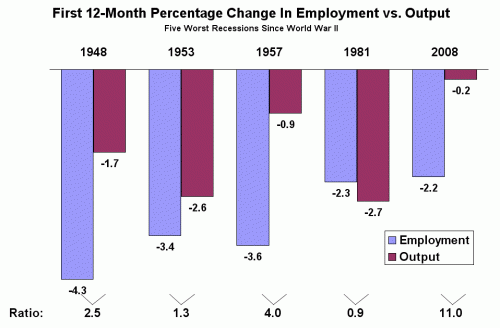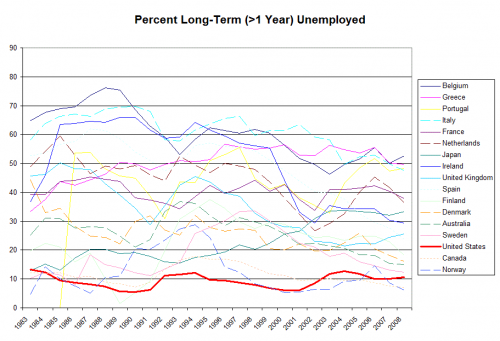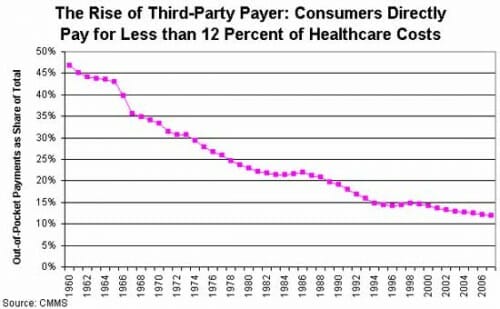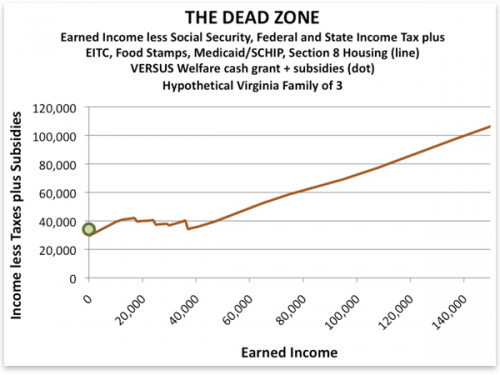At what point do politicians bear some public accountability for their public statements and the effect those statements have on the economy? I almost want to ask Obama and Pelosi -- what is the minimum size of pork-spending bill you will accept so we can just go ahead and pay the money and get you and your cohorts to shut the hell up on trying to convince everyone we are in the Great Depression. Because, to some extent, such statements can be a self-fulfilling prophesy. Seriously, the biggest stimulative effect of passing this stimulus bill will be, almost without doubt, that it will end the felt need for Washington weenies to create an atmosphere of panic.
Now, I suspect that I would have a different observation if I lived in Detroit, but I ask every business owner or manager I meet for the personal evidence they have of economic cataclysm. Is their business down? And in a surprising number of cases, I get the answer that their business is doing OK, but they are cutting back because surely the worst is soon to come, based on everything they see in the media. And do you know what? I have done exactly the same thing. I had one bad month, but since then things have been pretty steady, but I am cutting like crazy anyway, because I can't ignore the only other information source I have on the economy, which are pronouncements in the media.
I strongly believe that public pronouncements of doom, starting last October with Henry Paulson and continuing now to almost daily excess by Obama (today's statement: the economy is in a "virtual free fall") have measurably contributed to job losses in this country. Many people who are on the street without a job today can probably trace their unemployment to "just in case" cuts made more in response to government assurances of doom as on actual declines in output.
I can't prove this, of course, but I will present one pretty good pointer that I might not be totally full of it. With the January jobs report, the recent recession has become one of the five worst since WWII in terms of jobs losses as a percentage of the work force (I know you may, from reading the paper and listening to Obama, think it is the worst, but it is still only the fourth or fifth worst). Let me compare the job losses and the output declines at this point in the recession for these 5 recessions:

As you can see, we have had far more job losses relative to output losses than any major post-war recession. This does not mean that more output losses are not coming, but it means that, perhaps unique to this recession, job losses are preceding rather than following output losses -- in other words, job losses are occurring more than in any other recession based on the expectation of output losses, rather than in reaction to them. I wonder who it is that is setting these expectations?
Wow, using panic to achieve political aims and in the process accelerating job losses. And they say we libertarians are heartless!
Data updated by the Minn. Fed here. They actually have job losses through 13 months, but I jused 12 months because there are only quarters for the output numbers.
Update: Via the Washington Times:
Just Friday, Mr. Obama said a report that 600,000 jobs were lost in January meant "it's getting worse, not getting better. ... Although we had a terrible year with respect to jobs last year, the problem is accelerating, not decelerating." Last week he said, "A failure to act, and act now, will turn crisis into a catastrophe."
But he isn't the only Democrat ramping up the rhetoric while talking down the economy. House Speaker Nancy Pelosi of California said last month that our economy "is dark, darker, darkest." Rep. David R. Obey of Wisconsin said, "This economy is in mortal danger of absolute collapse." And Sen. Claire McCaskill of Missouri said of the economic-stimulus bill, "If we don't pass this thing, it's Armageddon."







